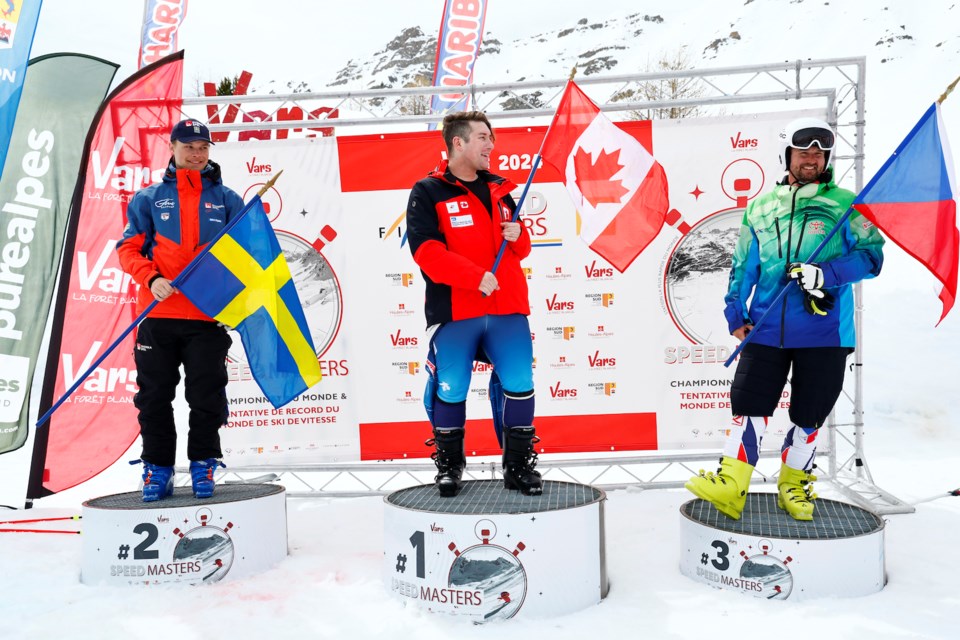A typical men’s World Cup downhill race features average velocities between 95 and 112 kilometres/hour, with some contestants topping out at more than 150 km/hr in certain stretches. Pretty impressive, right? But we’re not talking about downhill or its relatively familiar cousins in the alpine world.
Instead we’re here to discuss speed skiing, with France’s Simon Billy setting the world record of a whopping 255.5 km/hr. Valentina Greggio of Italy established the ladies’ record at more than 247 km/hr. They and their peers are the only athletes in a non-motorized sport to experience acceleration on par with what a Formula One driver feels in the cockpit.
Jonathan Simpson, known professionally as Johnny Aether, isn’t yet within striking distance of those numbers. His personal best of 171.8 km/hr was, however, enough to win him this year’s FIS S2 Speed Skiing World Championship.
Victor Persson of Sweden earned silver (169.3 km/hr) and Czechia’s Petr Koudela went home with bronze (168.63 km/hr).
The S2 division includes those who compete using gear suitable for standard alpine skiing, while the faster and more prestigious S1 class requires athletes to obtain purpose-built equipment.
“If I'd been working at the sport for a long time, I would give you some sort of really meaningful speech … but this experience has renewed my love for sport in general,” Aether said.
Need for speed
Ski racing has always been in Aether’s blood. He cut his teeth as a boy with Club Mont Ste-Marie in the Ottawa region while taking part in Whistler-based summer camps. Later on, he became an NCAA Division III athlete at Rensselaer Polytechnic Institute in New York.
After concluding his education at Simon Fraser University (SFU), Aether became an operations program manager for STEMCELL Technologies in Vancouver. He thought his competitive days were over, and for good reason. How many people throw themselves back into high-level sport in their 30s, with an established career path already before them?
That’s why Aether didn’t initially take it seriously when Mark Rowan, president of the Canadian Snowsports Association began scouting him for speed skiing. In fact, he thought it to be a joke—but the stars began to align.
The S2 World Championships were moved to Vars, France, the very track where Billy and Greggio achieved their records. Aether was invited to join, and he ended up doing so for fun.
“When do you have an opportunity to do something crazy like this as an adult with a desk job?” he remembers asking himself. “I’ve been retired from alpine racing for over a decade, easily.”
One would think that Aether formerly specialized in downhill or super-G given the nature of his new sport. Yet his best discipline by far was the highly technical slalom, which gave him an acute awareness of stance and base useful in speed skiing. He’s also something of a daredevil, which helps.
“There was so much rather dangerous straight-lining that I've done over my life because there's always been a need for speed,” Aether admitted.
I’m the juggernaut
Aether more or less touched down in Vars cold turkey. He had never previously trained on a speed skiing run, and nobody knew who he was. Regardless, all kinds of Europeans welcomed him with open arms—a far cry from the often intensely competitive environment of alpine skiing.
“There were races where I have spoken to other Canadian athletes—Canadians, who are some of the friendliest people—and they would turn around, walk away and ignore me because they knew I came from [a U.S. school],” recalled Aether. “I’m not trying to trash-talk anybody here, but everyone's competing for the same sponsorships and resources.”
One must give their whole life to becoming an elite alpine athlete. Professionals train seven days a week, on and off of snow, and spend many of their remaining hours fine-tuning gear. Speed skiers, conversely, master a more specific skill: how to distribute their mass and hold a tight tuck to be as aerodynamic as possible.
It’s not as all-encompassing, which perhaps makes speed skiers more comfortable with lending a helping hand.
Aether spent several training days out with Team Czechia. At one point, a Swede named Carl Ribbegårdh offered him a pair of poles more suitable for the task than what he’d brought.
The Whistlerite wore his baggy neon construction suit in practice, which slowed him down noticeably. Despite that, he brought speed when it counted the most on March 25, winning the competition by healthy margins.
Aether is all-in. He’s already working with an Olympic-calibre trainer in preparation for the following season, where he’s qualified to partake in the S1 division. To do so, he’ll need sponsorship along with some custom equipment: including a latex ski suit and the distinctive, wing-shaped headgear he calls the “Juggernaut” helmet (as it resembles one worn by a specific Marvel Comics supervillain).
“Maybe I'm full of myself, maybe I'm overly confident, maybe that's what you need to be in this sport, but I feel like I’m really close,” Aether said. “Next year, my goal is to start dialling in the gear and getting my stuff as heavy and aerodynamic as is allowed.”
Perhaps the Crazy Canucks would be proud of him.




